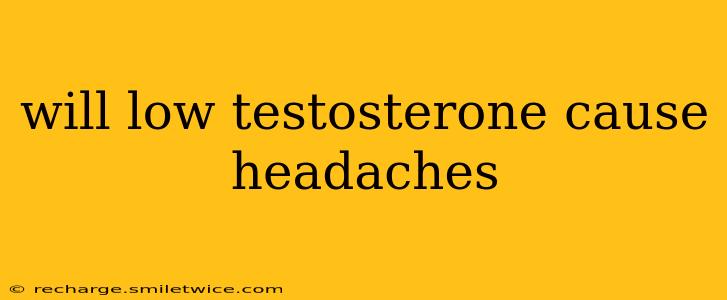Low testosterone, also known as hypogonadism, can be a significant health concern affecting many men, and its symptoms are varied and sometimes subtle. While not a universally experienced symptom, headaches are among the potential side effects associated with low testosterone. However, it's crucial to understand that a headache alone isn't a definitive indicator of low T. Many factors can cause headaches, and low testosterone is just one possibility among many. This article will explore the connection between low testosterone and headaches, answering common questions and providing valuable information for those concerned about their hormone levels.
Can Low Testosterone Cause Headaches Directly?
The relationship between low testosterone and headaches isn't straightforwardly causative. Low testosterone doesn't directly cause headaches in the same way that a migraine might. Instead, the connection is often indirect and can be influenced by other factors. For example, some studies suggest a correlation between low testosterone and an increased risk of certain types of headaches, particularly those linked to vascular changes. However, more research is needed to definitively establish a direct causal link.
What Other Symptoms Might Accompany Low Testosterone and Headaches?
Experiencing headaches alongside other symptoms is often more indicative of low testosterone. These symptoms can vary widely depending on individual factors and the severity of the hormonal imbalance. Some common symptoms that might accompany headaches and suggest low testosterone include:
- Reduced libido: Decreased sex drive is a hallmark symptom of low testosterone.
- Erectile dysfunction: Difficulty achieving or maintaining an erection.
- Fatigue and low energy: Feeling constantly tired or lacking motivation.
- Decreased muscle mass and strength: Noticeable loss of muscle tone and strength.
- Increased body fat: Gaining weight, particularly around the abdomen.
- Mood changes: Irritability, depression, or anxiety.
- Reduced bone density: Increased risk of fractures.
How Can I Tell if My Headaches are Related to Low Testosterone?
It's impossible to definitively determine if your headaches are caused by low testosterone without a proper medical evaluation. A doctor can perform blood tests to measure your testosterone levels and assess your overall health. They will consider your symptoms, medical history, and lifestyle factors to provide an accurate diagnosis. Simply having headaches alongside some other symptoms listed above does not automatically mean you have low T. It only warrants a consultation with a healthcare professional.
What Are the Treatments for Headaches Related to Low Testosterone?
Treatment for headaches associated with low testosterone typically focuses on addressing the underlying hormonal imbalance. This may involve testosterone replacement therapy (TRT), which can help restore testosterone levels to a healthy range. However, TRT isn't suitable for everyone, and its use should be carefully monitored by a physician due to potential side effects. If your headaches are primarily due to low testosterone, managing your hormone levels might alleviate the headaches. But it is essential to note that even with treatment, headaches may persist, requiring additional management strategies.
Can Other Hormonal Imbalances Cause Headaches?
Yes, absolutely. Hormonal imbalances other than low testosterone can also contribute to headaches. These can include thyroid problems, imbalances in estrogen (in women), and other hormonal irregularities. A comprehensive medical evaluation is vital to identify the root cause of your headaches. It's important to rule out other potential causes before attributing your headaches solely to low testosterone.
When Should I See a Doctor About Headaches?
You should seek medical attention if you experience frequent or severe headaches, especially if they are accompanied by other concerning symptoms like those mentioned above. Persistent headaches warrant a visit to the doctor to determine the underlying cause and receive appropriate treatment. Don't delay seeking professional help if you have concerns about your health.
Disclaimer: This information is intended for educational purposes only and should not be considered medical advice. Always consult with a qualified healthcare professional for any health concerns or before making any decisions related to your health or treatment. They can properly diagnose the cause of your headaches and recommend the best course of action.
